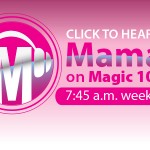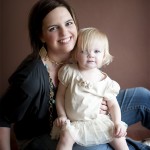By Gwen Rockwood, newspaper columnist and mama of 3
When I was in my mid-twenties, I went to work for an ad agency and learned an important truth: “Money ain’t funny.” It was something my boss always used to say as a way to remind us not to make errors on billing and to treat our client’s budget with the utmost respect.
I did always respect my client’s budget. I just wish I’d done a better job of respecting my own. It’s embarrassing to admit it, but I’m in my mid-thirties and I’m just now learning how to respect my own money.
The lights started to come on a few weeks ago when Tom and I started attending this class through our church called Dave Ramsey’s Financial Peace University. Ramsey is a well-known radio personality, best-selling author and motivational speaker. We took the class because becoming debt free seemed like “a good idea on paper.” But I wasn’t convinced it was necessary or even practical. Our generation has come to see debt as an inevitable part of life. We’ve got a house, three kids, two dogs and debt. Doesn’t everybody have it?
I found out the answer is “no.” Some people actually live debt-free, and they do it quite happily. They don’t have a big, scary credit card bill waiting to kick them in the financial rear at the end of the month. They have some money in the bank, in case of emergency. And they manage their money the way our grandparents used to manage theirs. Sounds crazy, I know, but it’s true.
Tom and I started talking about how great it would feel to be totally debt-free. And we agreed that this kind of financial security is exactly what we want for our kids as they grow up and what we want to teach them to do in their own lives.
So, hesitantly, we ditched the credit cards and are now on a cash-only system – what Ramsey calls the “envelope system.” In the class, Ramsey says paying with cash automatically helps control spending because it’s more painful to let go of actual cash than it is to slide a credit card through a machine. During the past two weeks, I’ve definitely felt that difference.
Truthfully, I miss the convenient zip-zip of my credit card. I miss the way I never really had to think about it as long as the credit card was there in my purse.
Yesterday I went grocery shopping with only the cash in my envelope. Suddenly, I noticed the price of everything and made a shocking discovery: THINGS ARE REALLY EXPENSIVE. Can’t believe I didn’t notice it before. But knowing I’d have to part with all those twenty-dollar bills made me use a different set of criteria for what went into my shopping cart. Anything in the cart had to rise to the level of “really need it,” and not just “kinda want it.” It’s easy to get a bunch of “kinda want it” when a credit card is picking up the tab and the actual bill is coming by mail 20 days from now.
When I checked out at the register, my bill came to half of what it typically is. I was amazed because I still managed to get the essentials we needed. I guess all those “kinda want it” items had been inflating the bill more than I’d realized. As the checker counted the cash I handed her, the man behind me in line jokingly said to the young clerk “Those bills and coins make it hard on you, don’t they? I’ve got a credit card so I’ll be easy.”
She laughed a little at his joke as I pushed my cart full of groceries and kids toward the door. And I laughed a little, too, because it struck me as ironic. In our culture, the money pendulum has swung so far in the credit direction that “paying as you go” suddenly seems like a fresh idea.
I also thought about the last word the man behind me in line had said: “easy.” He’s exactly right. The great thing – and the dangerous thing – about credit cards is how they make everything so easy. Easy to spend, easy to ignore your own financial reality, and easy to make smaller payments instead of paying it off (even when you promise yourself you will). It’s all so easy. And that’s why it’s also easy for families to end up living paycheck to paycheck – regardless of whether they make $20,000 a year or $200,000. Debt is an equal-opportunity mistake.
I’d be lying if I said there haven’t already been a few times I’ve wanted to dig through the trash, find the pieces and tape that credit card back together. For so long now, I’ve thought of it as my financial safety net. But perhaps that net was really a trap all along. And I want out. I want a taste of the freedom those debt-free people have.
The plan for getting out is simple and ridiculously unsophisticated. You don’t even need an “app” for it, and there’s nothing “creative” about this kind of financing. It’s just about counting money, paying bills and borrowing nothing. It feels true and honest, and I like that.
Money definitely ain’t funny. But if we can get completely out of debt and build up a cushion to protect us in this bumpy economy, I think we’ll definitely be the last ones laughing – all the way to the bank.






Hey Gwen,
Kudos to you on your new pursuit! In one of Ramsey’s books, he says you can cut your grocery spending by 15-20% by using cash. I didn’t believe that was the case for me–boy was I wrong! I quit using the credit card at the grocery store, and lo and behold, within a month or two, our grocery spending had dropped by about 15%.
Godspeed to you and yours!
great article!! we have been doing dave ramsey a few years and spend so. much. less. than we used to. way to go!